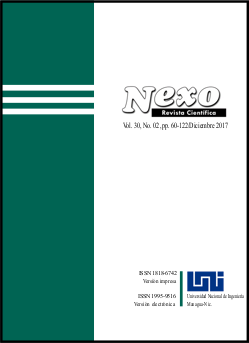AISLAMIENTO E IDENTIFICACIÓN DE BACILLUS subtilis Y EVALUACIÓN DEL ANTAGONISMO IN VITRO FRENTE HONGOS FITOPATÓGENOS
DOI:
https://doi.org/10.5377/nexo.v30i2.5530Palabras clave:
Bacteria, control biológico, microorganismo, bioinsumo, antagonismo.Resumen
Los microorganismos fitopatógenos son una amenaza importante para la producción de alimentos y su control mediante el uso de microorganismos antagonistas es una práctica mundial, lo que ha llevado a la investigación y búsqueda de nuevos aislamientos que sean efectivos en el control biológico. En esta investigación se llevó a cabo el aislamiento e identificación de bacterias a partir de bioinsumos producido artesanalmente en Nicaragua y se evaluó in vitro su antagonismo frente a hongos fitopatógenos de interés agrícola. Se realizó la caracterización morfológica de 14 aislados bacterianos y confirmación por secuenciación del gen ADNr 16S; posteriormente se evaluó el potencial antagónico mediante confrontación dual frente a los hongos identificados como Fusarium equiseti, Fusarium sp. y Alternaría alternata. Como resultado se encontraron 6 cepas con efecto inhibitorio, sobresaliendo Bacillus subtilis cepa F con los mejores porcentajes de inhibición del crecimiento de los fitopatógenos evaluados en un rango de 50-100%. Otros resultados de interés fueron obtenidos mediante la identificación de Bacillus megaterium y la utilización de Rhizobium sp, este último inhibió entre 50-90% el crecimiento de los hongos, lo cual sugiere considerar su aplicación no solo como bioestimulante, sino también como bioprotector al inhibir de crecimiento de ciertos fitopatógenos.
Descargas
6235
Descargas
Publicado
Cómo citar
Número
Sección
Licencia
Los autores que publican en Nexo Revista Científica están de acuerdo con los siguientes términos:
- Los autores conservan los derechos de autor y conceden a la revista el derecho de la primera publicación bajo la licencia Creative Commons Attribution License, que permite a otros compartir el trabajo con un reconocimiento a la autoría de la obra y a la publicación inicial en Nexo Revista Científica.
- Los autores pueden establecer por separado acuerdos adicionales para la distribución no exclusiva de la versión de la obra publicada en la revista (por ejemplo, en un repositorio institucional o en un libro) con el reconocimiento de su publicación inicial en Nexo Revista Científica.
- Se permite y se anima a los autores a difundir sus trabajos electrónicamente (por ejemplo, en repositorios institucionales o en su propio sitio web) antes y durante el proceso de envío, ya que puede dar lugar a intercambios productivos, así como a una citación más temprana y mayor de los trabajos publicados.










